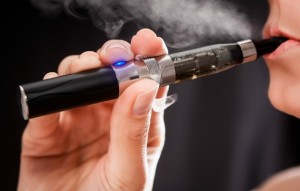New FDA rules for e-cigs could give advantage to Big Tobacco

By Eric Boehm | Watchdog.org
MINNEAPOLIS — Electronic cigarettes are practically nothing like their flammable namesakes, aside from their general size, shape and the fact they deliver a legal drug — nicotine — via the mouth to the lungs.
GATHERING EVIDENCE: The FDA is looking for input and public comment on proposed new that would regulate e-cigarettes like tobacco cigarettes, even though the electronic kind of smoking uses no flame, smoke or – most importantly – tobacco.
But those similarities are close enough for the Food and Drug Administration, which unveiled new proposed rules on Thursday for e-cigarettes — the first time the federal government has written regulations for the increasingly popular devices.
The new rules prohibit the sales of e-cigarettes to minors and will require manufacturers to submit to FDA oversight regarding the manufacture and advertising of the products.
A 75-day public comment period will happen before the new rules are adopted.
The new rules could squeeze some manufacturers out of the nascent but growing e-cigarette marketplace in favor of so-called “Big Tobacco” firms, capable of throwing their muscle around to influence the rule-making process.
But the FDA said the new rules were about consumer protection.
“The proposed rules would give the FDA additional tools to protect the public health in today’s rapidly evolving tobacco marketplace, including the review of new tobacco products and their health-related claims,” Mitch Zeller, director of the FDA’s Center for Tobacco Products, said in a statement.
That review process is a major part of the new rules for e-cigarettes. Companies that make the devices will have to register with the FDA, submit comprehensive lists of all ingredients used and disclose manufacturing procedures.
Manufacturers have touted e-cigarettes as a safer alternative to the real thing, since there is no combustion or actual smoke inhaled. Instead, a small battery powers a heater converting a mixture of nicotine, flavoring and water into vapor.
The FDA wants to review the science behind those claims, which, the agency said, was a major reason for the new rules.
REGULATING OR REORGANIZING: Some experts fear the regulations will force small e-cig manufacturers out of business and will tilt the market towards Big Tobacco, which can afford the lobbyists who will influence the final product.
Gilbert Ross, executive director and medical director of the American Council on Science and Health, said the new rules also could stifle innovation in the still-developing e-cigarette industry and allow large tobacco companies to dominate smaller ones.
The e-cigarette marketplace is highly fragmented at the moment, with more than 200 different manufacturers — from so-called “Big Tobacco” producers such as Phillip Morris and R.J. Reynolds to smaller makers that focus only on the electronic products. Business is booming for all of them — sales of e-cigs are expected to top $2 billion this year.
“Many smaller e-cig companies will either go under or seek ‘protection’ from the major tobacco companies via buyout/takeover,” Ross warned. “Big Tobacco will come out the winner — by either absorbing small companies unable to bear the FDA approval expense, or just by waiting it out.”
David Howard, a spokesman for Reynolds American, the parent company of R.J. Reynolds, said the firm would participate in the rule-making process and would provide comments to the FDA after reviewing the proposed rules.
The issuance of the draft rules kicks off a 75-day public comment period.
But while the FDA is getting into the game of regulating e-cigarettes, many states already have begun restricting use and sale of the devices.
Their sometimes-comical experiences might give some guidance to the FDA.
Lawmakers in Iowa, for example, struggled with an issue the federal government is sure to encounter: Is it possible to call an e-cigarette a “tobacco product” — and thus regulate it as one — when the devices contain almost no tobacco?
Several states and some cities have banned the sale of e-cigarettes to minors. Others are in the process of approving such a ban. The FDA rule would ban sales to minors nationwide.
Anti-smoking activists have pressed for the bans because they see e-cigarettes as a gateway to the real thing.
But studies show that isn’t the case — more often than not, e-cigarettes are used by smokers who need help quitting, rather than the other way around. Other studies question the supposed health risks of the non-tobacco, non-flammable devices.
The FDA says they need more time to determine which side of that debate is correct.
The draft regulations also cover cigars, pipe tobacco and various other forms of tobacco products developed as alternatives to cigarettes. Those products were previously beyond the scope of federal regulations of tobacco.
Boehm is a reporter for Watchdog.org and can be reached at EBoehm@Watchdog.org. Follow @WatchdogOrg and @EricBoehm87 on Twitter for more.







